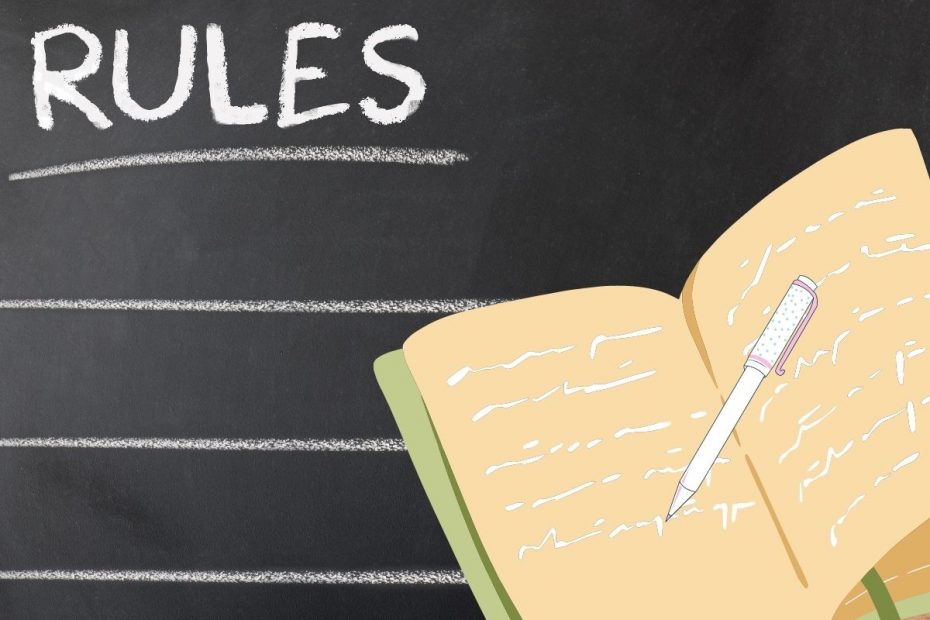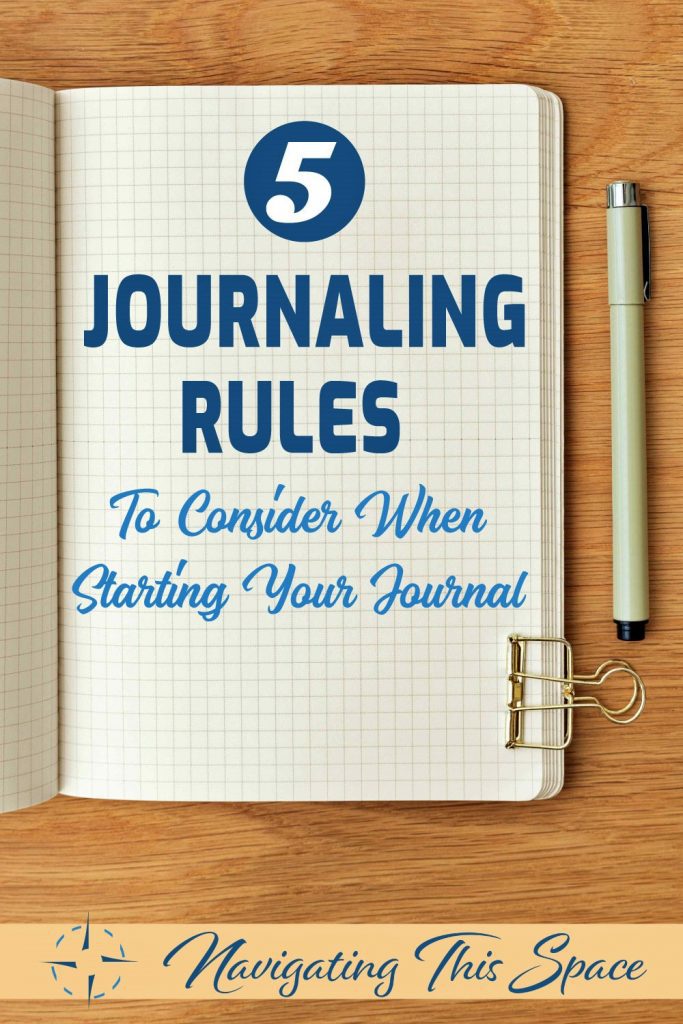Journaling is a powerful tool that can help you change your life and create the future you want. It has been shown to reduce stress, improve confidence, and provide clarity on what is holding us back from our goals.
Journaling also helps build self-esteem by tapping into the power of positive thinking.
With all these benefits, it’s no wonder journaling has become one of the most popular forms of therapy in recent years!
This blog post will discuss 5 journaling rules to consider when starting your journal.
- 1. Set a Realistic Journaling Schedule
- 2. Choose the Right Notebook for You
- 3. Write, Draw, or Paint Whatever You Want
- 4. Be Honest With Yourself
- 5. Start With One Sentence
- Do It Your Way
- Questions You May Have
1. Set a Realistic Journaling Schedule

Journal writing is personal, and it should be done whenever you feel like it. The moment it becomes overwhelming is the moment you’ll throw your journal aside and forget about it.
The blank pages shouldn’t intimidate you. Instead, they should intrigue you to fill them with your thoughts, goals, and dreams.
If you’re just starting out, don’t expect to write daily in your journal.
I’ve stopped and restarted so many times I’ve lost count.
Journaling takes practice, and it can take weeks, months, or years before you find your writing groove.
Set a journaling schedule that works best for you! If that means writing whenever you feel like it, then write whenever you feel like it.
There is no right or wrong way of doing this.
As a simple start for your writing journey, try writing things down as a way to process and understand confusing situations to free your mind from the clutter and the traps of overthinking.
Start small and go at your own pace.
2. Choose the Right Notebook for You

Some people prefer spiral notebooks, while others like a hardbound book or even an online platform. Whatever medium you choose, it has to mesh well with your style.
Think about it, if you hate looking at something, you’re going to avoid it with every ounce of your being. That’s not very productive if your goal is to start journaling.
Get a journal notebook that you love to feel and write in. Maybe it has a fancy, fun, and motivational cover and dotted pages or blank internal pages with a plain hardcover. The choice is yours.
You know what you like, so get what you would love to use every day.
3. Write, Draw, or Paint Whatever You Want
Sometimes the messages in our heads cannot be interpreted through words alone, and this is where your journal truly shines. It’s your creativity center designated by you to hold all your thoughts and lessons from your inner self.
You do not need to write words on paper to record what’s going on in your head or in your life. Sometimes words aren’t enough, and that’s more than okay. Embrace that feeling and express it to the best of your abilities.
Don’t judge yourself on the aesthetic or the professional level of your art creation. Art has a different interpretation for everyone. You may have a different interpretation every time you look at what you created.
Don’t let the need to be perfect stop you from creating what you need to grow.
4. Be Honest With Yourself
The most important rule of journaling is, to be honest with yourself.
When you lie to yourself, you hinder and stunt your personal growth. You allow deception the space it needs to flow and manipulate your thoughts and actions.
Keep yourself honest and unbiased. If you did something wrong, admit that you were wrong. Then, you could begin the journey to uncover where the urge came from and do something about it.
The words you write offer a glimpse into the inner workings of your mind.
On days when you’re reflecting on your written words, you’ll begin to see the connecting dots more clearly.
Don’t rob yourself of that experience and potential clarity. Your journal serves as your guide for self-discovery and soul searching. Starting and continuing your journey with complete honesty will help you heal your past wounds and become a better person to yourself and others.
Save yourself from years of endless loops and self-sabotage by always being honest with yourself.
5. Start With One Sentence
You only need to write one sentence to start writing in your journal.
Eventually, that one sentence will turn into two. Before you know it, you have a whole paragraph written.
Don’t be too hard on yourself.
Search your mind for a simple but inspirational message you saw throughout your day and write it down. You don’t need to have a specific subject. Your life and mind cannot entertain only one thing all the time. If it did, you’d be on auto-pilot 24/7 and bored out your mind.
Write about things you’re excited about, things that give you joy, or things that make you feel angry. Your journal is a safe space for you to vent your emotions and analyze the things you respond to.
Allow yourself to feel free and better by letting your emotions out instead of allowing the pressure to build up inside you until there’s an explosion or implosion.
Follow your mind wherever it leads you.
It all starts with one sentence.
Do It Your Way
Writing in your journal should entice you to keep writing as much as you can. It should free your mind with every word written, drawn, or painted on every page.
Writing in your journal is not meant to be a chore or just another item on your to-do list. It’s an experience that should offer clarity at the beginning or end of your day.
Let the process unfold naturally without expectations or limitations.
Journal when you’re inspired, when you’re feeling down, confused, or bored.
All those feelings locked inside need somewhere they can go, so give them a home!
Even if it’s just one sentence, record how you’re feeling right now before you get distracted by something else and forget to check in with yourself.
The ultimate rule to follow when you begin writing in a journal is to do it your way.
No one can tell you how to write to fill the pages, and no one can keep you accountable to yourself. That task is one hundred percent yours.
Your journey begins with one sentence …
Questions You May Have
How to start a journal?
It’s very easy to start a journal, even though it might seem very nerve-racking. First, select a journal that’s aesthetically pleasing to you. Then, grab your favorite pen, and start writing what’s on your mind. Don’t worry about following any journaling rules precisely. You can start your journaling process however you see fit. Just start writing
What do I write in my journal?
One approach is to write simply about your day. That may include:
・Questions for reflection
・Ideas and insights
・Random thoughts and realizations
・Actions taken and reactions to those actions, and predictions of those reactions from others or yourself. What you choose to write or draw is entirely your choice.
How to write a good journal?
What makes a journal good in your opinion? Is it how you write on the pages, the drawings, or scribbles you make to express a certain emotion, or is it the things you include, such as the events of your day, your thoughts, and feelings? The good news is there is no good or bad journal. You create your version of a masterpiece, and that’s what makes it special.
What are examples of journals?
A journal can be anything you want it to be. It could be a small book or notebook where you record your daily activities, or it could even be the list of movies you watched recently. From a goals journal to a dream journal, the possibilities are endless. If you can think of it, it can be a journal, so allow your mind to explore the many different possibilities.






This is a great starter guide! And I love that you incorporate flexibility. I find so many journalling systems are so rigid that they scare of newbies – but the purpose is really to find something that works for you, and you’ve indicated that well here. Great post!
Thanks for reading and commenting Colleen. You’re right most systems are too rigid for beginners, you have to do things at your pace so it’s enjoyable.
I’ve always wanted to to start journaling and I did many times, but I always get discouraged… thank you for your tips! I think I’ll try them this holiday ♥️♥️
You’re very welcome Nelly. If you’re starting to feel discouraged when you try again, just walk away and start again. Journaling should be fun.